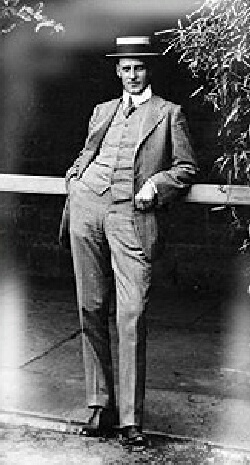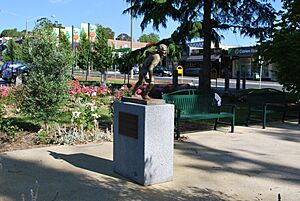Edwin Flack facts for kids
| Personal information | ||||||||||||||||||||||||||
|---|---|---|---|---|---|---|---|---|---|---|---|---|---|---|---|---|---|---|---|---|---|---|---|---|---|---|
| Nickname(s) | Teddy | |||||||||||||||||||||||||
| Nationality | Australian | |||||||||||||||||||||||||
| Born | 5 November 1873 Islington, London, England |
|||||||||||||||||||||||||
| Died | 10 January 1935 (aged 61) Melbourne, Victoria, Australia |
|||||||||||||||||||||||||
| Sport | ||||||||||||||||||||||||||
| Sport |
|
|||||||||||||||||||||||||
|
Medal record
|
||||||||||||||||||||||||||
Edwin Harold Flack (born November 5, 1873 – died January 10, 1935) was an amazing Australian athlete and tennis player. People often called him "Teddy." He made history as Australia's very first Olympian, being the only person to represent Australia at the first modern Olympic Games in 1896. He also became the first Olympic champion in the 800 metres and 1500 metres running races.
After his incredible Olympic journey, Edwin Flack decided not to compete in big sports events anymore. Instead, he focused on breeding cattle and helping with his family's accounting business. He passed away at 61 after an operation and was buried in his hometown of Berwick. Today, a bronze statue and a sports reserve in Berwick honor his memory. Flack was also recognized in the Sport Australia Hall of Fame in 1985 and the Athletics Australia Hall of Fame in 2000.
Contents
Early Life and Sports Beginnings
Edwin Flack was born in London, England. When he was five years old, his family moved to Australia, settling in Berwick, Victoria. After finishing school at Melbourne Grammar School in 1892, he joined his father's accounting company.
From 1892 to 1894, Edwin was a keen runner in Victoria. He competed in middle and long-distance races with the Melburnian Hare & Hounds athletics club. In October 1892, he finished third in a 10-mile cross country race.
In November 1893, Edwin competed in the Australasian Athletics Championships in Melbourne. This event brought together athletes from different British colonies that would later become Australia and New Zealand. Edwin won the mile race, showing his talent. He also ran in the 880 yards and three miles races.
In December 1894, Flack won both the 880 yards and mile championships in Victoria. Later that year, he moved to London to train further as an accountant. While there, he joined the London Athletic Club. He was determined to compete in the very first modern Olympic Games. Even though he joined a London club, he proudly wore his Melburnian Hare and Hounds colors at the Olympics.
Edwin Flack at the 1896 Olympics
Edwin Flack traveled to Athens, Greece, for the 1896 Olympic Games. The journey by train and sea was tough, and he suffered from seasickness.
On the first day of the Games, he won his first race, a heat in the 800 metres run. On the second day, he faced American favorite Arthur Blake in the 1500 metres run. Running side-by-side with Blake, Flack pushed ahead at the end to win by more than five meters! On the fourth day, he earned his second gold medal by winning the 800 metres final.
It's interesting to note that the winning times for the 800m and 1500m at these first Olympics were slower compared to other races of that time. For example, the mile run in New Zealand that year was faster than Flack's 1500m time, even though the mile is a longer distance.
Just one day after his wins, Flack decided to try for a third gold medal in the marathon. This was a huge challenge because he had never run a race longer than 16 kilometers before. For much of the race, he was in second place behind a French runner, Albin Lermusiaux. After about 30-32 kilometers, the Frenchman dropped out, leaving Flack in the lead. However, a few kilometers later, Flack collapsed from exhaustion. In his confusion, he even accidentally punched a spectator who tried to help him! He was taken off the course and brought to the stadium, where Prince Nicholas looked after him.
Flack also competed in tennis at the Olympics. He played in both singles and doubles. In singles, he lost his first match. In doubles, he teamed up with his English friend, George S. Robertson. They reached the semi-finals but lost their only match. Even though they lost in the semi-finals, they were later awarded a bronze medal because third-place medals were not given out at the time but were added retroactively in 2008.
Edwin Flack was very popular at the 1896 Games. People often called him the "Lion of Athens."
Later Life and Legacy
In 1898, Edwin Flack returned to Victoria, Australia, and joined his family's accounting firm, which was renamed Flack and Flack. He bought a property near Berwick, where he spent weekends breeding Friesian cattle.
He never competed in sports for Victoria or Australia again. However, he joined the Australian Olympic Committee (AOC) and was part of the first Australian group to attend an International Olympic Committee (IOC) meeting. Edwin Flack passed away in 1935 at age 61 after a heart operation. His ashes were buried in Berwick Cemetery.
Edwin Flack's memory lives on in many ways. A bronze statue of him stands in Berwick, unveiled in 1998 by famous runner John Landy. The former Berwick Recreational Reserve was renamed Edwin Flack Reserve in 1996 to honor him. This reserve has several sports grounds, including an athletics track and fields for Australian rules football, netball, and soccer. Melbourne Grammar School, where he studied, also named its sports complex Edwin Flack Park.
In 1996, a 45-cent Australian postage stamp featured Edwin Flack to celebrate 100 years of the Olympics. The AOC named a street near Stadium Australia in Sydney, where the 2000 Summer Olympics were held, Edwin Flack Avenue. He was inducted into the Sport Australia Hall of Fame in 1985 and the Athletics Australia Hall of Fame in 2000. The Edwin Flack Award, given to athletes who have shown great service to athletics, is named after him.
Edwin Flack was even played by English actor Benedict Taylor in a 1984 TV mini-series called The First Olympics: Athens 1896.
Images for kids
See also
In Spanish: Edwin Flack para niños
 | James B. Knighten |
 | Azellia White |
 | Willa Brown |




